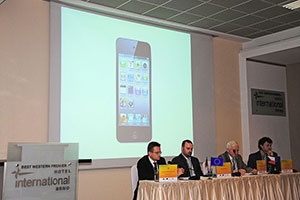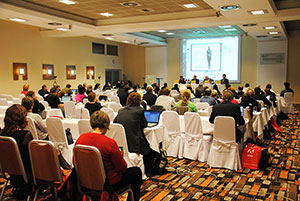
The 6th year of the MEFANET conference was held in Brno, Czech Republic, from Tuesday 27th to Wednesday 28th November 2012. This conference provides a regular opportunity for teachers and students from medical faculties from all over the Czech Republic and Slovakia to meet experts in health care informatics and providers of electronical support in the education. Apart from methodical and educational aspects of e-learning at medical faculties in general, this year's conference has again dealt with the impact of this phenomenon on a specific medical specialty: a thematically focused symposium addressed the fields of orthopaedics, rheumatology and physiotherapy.
The opening ceremony was started with a welcome speech given by Dr Ladislav Dusek, Chairman of the Coordinating Council of the MEFANET project and Director of the Institute of Biostatistics and Analyses at the Masaryk University (IBA MU), who reminded the participants that this annual meeting of teachers and students from all Czech and Slovak medical faculties has already become a tradition which significantly facilitates the implementation of modern teaching methods into the education of medical disciplines. Dr Jaroslav Sterba, vice-dean for the education of clinical disciplines at the Faculty of Medicine at Masaryk University (FM MU), then expressed his delight at the ever growing number of conference participants and appreciated its substantial benefits for the education of medical students in both countries (Czech Republic and Slovakia).
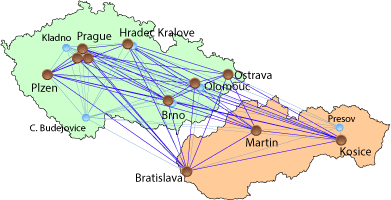
11 medical and 6 non-medical faculties from all over the Czech Republic and Slovakia participate in the MEFANET project.
In his introductory lecture on the state of the MEFANET (MEdical FAculties NETwork) project, Dr Dusek pointed out that all medical faculties in the Czech Republic and Slovakia (i.e., 8 Czech and 3 Slovak faculties) have agreed to participate in the project, representing more than 35,000 potential users (teachers and students). In addition, several non-medical faculties dealing with the education of future health care workers have recently joined the project. Dr Dusek demonstrated a steadily growing number of educational materials on the “central gate” of the MEFANET project (http://portal.mefanet.cz) and compared it to the previous – almost exponential – increase at the time of emergence of this portal, when almost nobody was concerned with the quality of involved articles. This inevitably led to flooding the portal with thousands of contributions and making its contents much less comprehensible. Therefore, the process of the so-called “mentally active check” was introduced more than one year ago: according to the new rules, all contributions which do not meet strict criteria on quality and extent of educational materials are moved from the central gate to the “sandbox” (http://sandbox.mefanet.cz). The recent trend, which prefers quality and reviewed contents of educational materials to their quantity, should be maintained in future. Many internet project have already documented that results from clinical practice have been increasingly utilized in the education of future health care professionals (e.g., www.mefanet.cz, www.wikiskripta.eu, moodle.mefanet.cz, www.akutne.cz, www.sepsis-q.cz and many others).
Pocket-size virtual patient
E-learning in education as well as the programme of the MEFANET conference quickly respond to recent developments in modern information and communication technologies. For example, the concept of “virtual patients” (see Note) was introduced at the MEFANET 2010 conference; two years later, the question of latest mobile devices (smartphones, tablets) and their utilization in medical education was addressed at the same forum. In a joint lecture, Dr Daniel Schwarz and Mr Martin Komenda from IBA MU summarized available platforms for the creation of interactive teaching materials and e-learning courses.
Two UK experts in electronical support in the education of clinical disciplines accepted the invitation to the MEFANET 2012 conference: Dr Adrian Raudaschl from the NHS Greater Glasgow and Clyde, and Dr Luke Woodhome from St George's, University of London. Utilization of modern mobile devices (smartphones and tablets in particular) in the education of medical students was the common denominator of their lectures. Dr Woodham described an original way of motivating medical students to practising their knowledge: researchers from St George's made use of popularity of smartphones among students and developed an iPhone application that simulates virtual patients and nowadays contains dozens of clinical cases (www.mededcases.com). The concept of virtual patients has been finding its way into the curriculum of Czech and Slovak medical faculties only recently, but students from both countries might soon improve their knowledge using their smartphones, too.
Programme Committee
See the list of abbreviations at the end of this page to read the affiliation of Programme Committee members.
Ing. Milan Blaha, Ph.D. (IBA MU)
MUDr. Lukáš Bolek, Ph.D. (FMP CU)
doc. RNDr. Ladislav Dušek, Ph.D. (IBA MU)
MUDr. Jitka Feberová, Ph.D. (2nd FM CU)
doc. MUDr. Jiří Gallo, Ph.D. (FM PU)
doc. Ing. Josef Hanuš, CSc. (FMHK CU)
Mgr. Martin Komenda (IBA MU)
doc. MUDr. Eliška Kubíková, PhD. (FM CU)
RNDr. Eugen Kvašňák, Ph.D. (3rd FM CU)
Ing. Jaroslav Majerník, Ph.D. (FM PJSU)
MUDr. Vladimír Mašín, Ph.D. (FMHK CU)
prof. MUDr. Vladimír Mihál, CSc. (FM PU)
Mgr. Lenka Orzelová (FM UO)
doc. MUDr. Oto Osina, PhD. (JFM CU)
Mgr. Jarmila Potomková, Ph.D. (FM PU)
MUDr. Jana Povová (FM UO)
prof. MUDr. Aleš Ryška, Ph.D. (FMHK CU)
Ing. Daniel Schwarz, Ph.D. (IBA MU)
Mgr. Katarína Soroková (FM CU)
prof. MUDr. Stanislav Štípek, DrSc. (1st FM CU)
RNDr. Čestmír Štuka, MBA, Ph.D. (1st FM CU)
PhDr. Michal Trnka, PhD. (FM CU)
MUDr. Martin Vejražka, Ph.D. (1st FM CU)
Organization Committee
Ing. Daniel Schwarz, Ph.D. (IBA MU)
Ing. Jaroslav Majerník, Ph.D. (FM PJSU)
Mgr. Martin Komenda (IBA MU)
In his videoconference presentation, Dr Raudaschl introduced another iPhone application which simulates virtual patients and common clinical cases, but is rather getting closer to a thrilling computer game. Researchers from the NHS Greater Glasgow and Clyde put great emphasis on this aspect, which has been recently referred to as the “gamification”. It is obvious that students will be much more interested in an attractive educational application than in a tedious transcription of a textbook. Gamification is the use of game thinking and game mechanics in a non-game context in order to engage users and solve problems. The Ward Round application (www.wardroundapp.co.uk) was officially launched towards the end of 2011 and has since attracted a lot of attention from medical students from all over the world.
E-learning in medical disciplines dealing with human musculoskeletal system
A minisymposium on e-learning in medical disciplines dealing with treatment of musculoskeletal system was chaired by Prof Jiri Gallo, MD, head of the Department of Orthopaedics at the University Hospital Olomouc. Prof Gallo emphasized that treatment of musculoskeletal disorders requires a multidisciplinary approach and that e-learning might present a promising way of raising awareness of this varied group of medical conditions among physicians of specialties other than orthopaedics itself (rheumatologists and general practitioners in particular) and among non-medical health care professionals (mostly physiotherapists). The minisymposium was thematically focused on the osteoarthritis of hip and knee, which presents a serious health problem in most economically developed countries and puts a significant strain on their health care systems. Prof Karel Pavelka, MD, director of the Institute of Rheumatology in Prague, accepted the invitation to the minisymposium, and informed the audience about the guidelines on osteoarthritis of hip an knee as recommended by the European League Against Rheumatism (EULAR). The spectrum of lecturers was extraordinarily varied: apart from physicians dealing with these issues in their everyday clinical practice, representatives of technical universities or departments talked about their research into biomechanics and related disciplines. Although the research focus of speakers was very heterogeneous, Prof Gallo appreciated it as an example of meeting which should take place more frequently if an interdisciplinary cooperation is to be established and deepened.
Practical issues
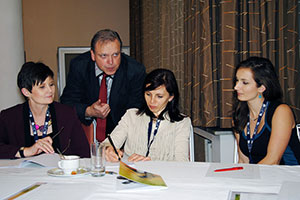
Practically-oriented workshops are a regular component of the MEFANET conference programme, and this year's conference involved two of them. The first workshop, which was led by Prof Ales Ryska, MD, PhD and Ilja Tacheci, MD, PhD from the Faculty of Medicine in Hradec Kralove, was focused on practical issues in the development of virtual case reports, or virtual patients. Unequal chances of medical students to see a specific condition during their internships in a hospital became the driving force for the development of virtual patients. The simulation of treatment options is very similar to the real clinical practice. During the diagnostic procedure, the student prescribes additional examinations based on the acquired information; an assessment is then made on the correctness of sequence of diagnostic steps and on the effectivity of treatment procedure (both from the view of strain on patient and from the economical point of view).
The second workshop was prepared by a team of authors from the 1st and the 3rd Faculties of Medicine at the Charles University, the Faculty of Medicine at the Masaryk University, and the Institute of Computer Science at the Academy of Sciences of the Czech Republic, and was focused on modern trends in electronic testing. In the first part, the authors summarized general procedures and principles applicable in the process of test development and described a possible way of analyzing results of individual students. The second part of the workshop was dedicated to various activities aimed at the education of teachers in testing procedures. A publication dealing with the development and analysis of tests used at medical faculties is being prepared, and a travelling seminar on these issues has been approved and is under preparation.
Non-medical health disciplines are on the rise
Several faculties ensuring the education of non-medical health care workers have recently joined the MEFANET project. A separate Coordinating Council for these faculties has been appointed and expert guarantors for educational materials from individual specialties were chosen during the MEFANET 2012 conference. A separate block of lectures was reserved for non-medical disciplines, demonstrating a huge number of sources and various materials available for the electronical education in these disciplines. Moreover, development of these materials has been financially supported by grants in both countries, and therefore many contributions can be soon expected to be published in the MEFANET project, too. Lecturers and discussion participants agreed that these activities need to be coordinated in order to prevent various authors from working on the same materials, and that it is essential to look for gaps in electronical teaching tools.
Chairman of the Coordinating Council re-elected
As usual, the conference was concluded by a public session of the Coordinating Council of the MEFANET project, where plans for near and more distant future were discussed; on this occasion, Dr Ladislav Dusek was re-elected to be the Chairman. The seventh year of the MEFANET conference will be held on the same premises and organized by the same team as this year's conference. If you are interested in the latest developments in modern education of medical disciplines, you will be very welcome at the MEFANET 2013 conference.
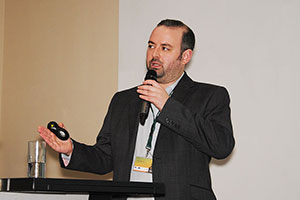 |
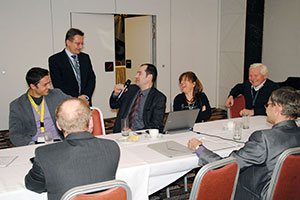 |
Video from the conference
Note
eViPs (electronic Virtual Patients) = interactive computer simulations of real clinical situations and scenarios aimed at training and education of future health care workers
List of abbreviations
| 1st FM CU | 1st Faculty of Medicine at the Charles University in Prague (Prague, Czech Republic) |
| 2nd FM CU | 2nd Faculty of Medicine at the Charles University in Prague (Prague, Czech Republic) |
| 3rd FM CU | 3rd Faculty of Medicine at the Charles University in Prague (Prague, Czech Republic) |
| FM CU | Faculty of Medicine at the Comenius University in Bratislava (Bratislava, Slovakia) |
| FM MU | Faculty of Medicine at the Masaryk University (Brno, Czech Republic) |
| FM PJSU | Faculty of Medicine at the Pavol Jozef Safarik University in Kosice (Kosice, Slovakia) |
| FM PU | Faculty of Medicine at the Palacky University in Olomouc (Olomouc, Czech Republic) |
| FM UO | Faculty of Medicine at the University of Ostrava (Ostrava, Czech Republic) |
| FMHK | Faculty of Medicine in Hradec Kralove at the Charles University in Prague (Hradec Kralove, Czech Republic) |
| tet | Faculty of Medicine in Plzen at the Charles University in Prague (Plzen, Czech Republic) |
| tet | Institute of Biostatistics and Analyses at the Masaryk University (Brno, Czech Republic) |
| tet | Jessenius Faculty of Medicine in Martin at the Comenius University in Bratislava (Martin, Slovakia) |
Contact
Ing. Daniel Schwarz, Ph.D.
Institute of Biostatistics and Analyses, Masaryk University, Kamenice 126/3, 625 00 Brno (Czech Republic)
Phone: +420 549 49 2854
E-mail: schwarz@iba.muni.cz
Mgr. Martin Komenda
Institute of Biostatistics and Analyses, Masaryk University, Kamenice 126/3, 625 00 Brno (Czech Republic)
Phone: +420 549 49 4469
E-mail: komenda@iba.muni.cz
Related contributions:
 Contribution content is subject to licence Creative Commons Uveďte autora-Neužívejte dílo komerčně-Nezasahujte do díla Attribution 3.0 Czech Republic
Contribution content is subject to licence Creative Commons Uveďte autora-Neužívejte dílo komerčně-Nezasahujte do díla Attribution 3.0 Czech Republic
Keywords: zdravotnická informatika, telemedicína, konference
citation: Daniel Schwarz, Lenka Šnajdrová, Jakub Gregor: 6th year of the MEFANET conference brought new ideas for the education of future health professionals. Multimedia support in the education of clinical and health care disciplines :: Portal of MU’s Faculty of Medicine [online] , [cit. 29. 11. 2025]. Available from WWW: https://portal.med.muni.cz/article-608-6th-year-of-the-mefanet-conference-brought-new-ideas-for-the-education-of-future-health-professionals.html. ISSN 1801-6103.
